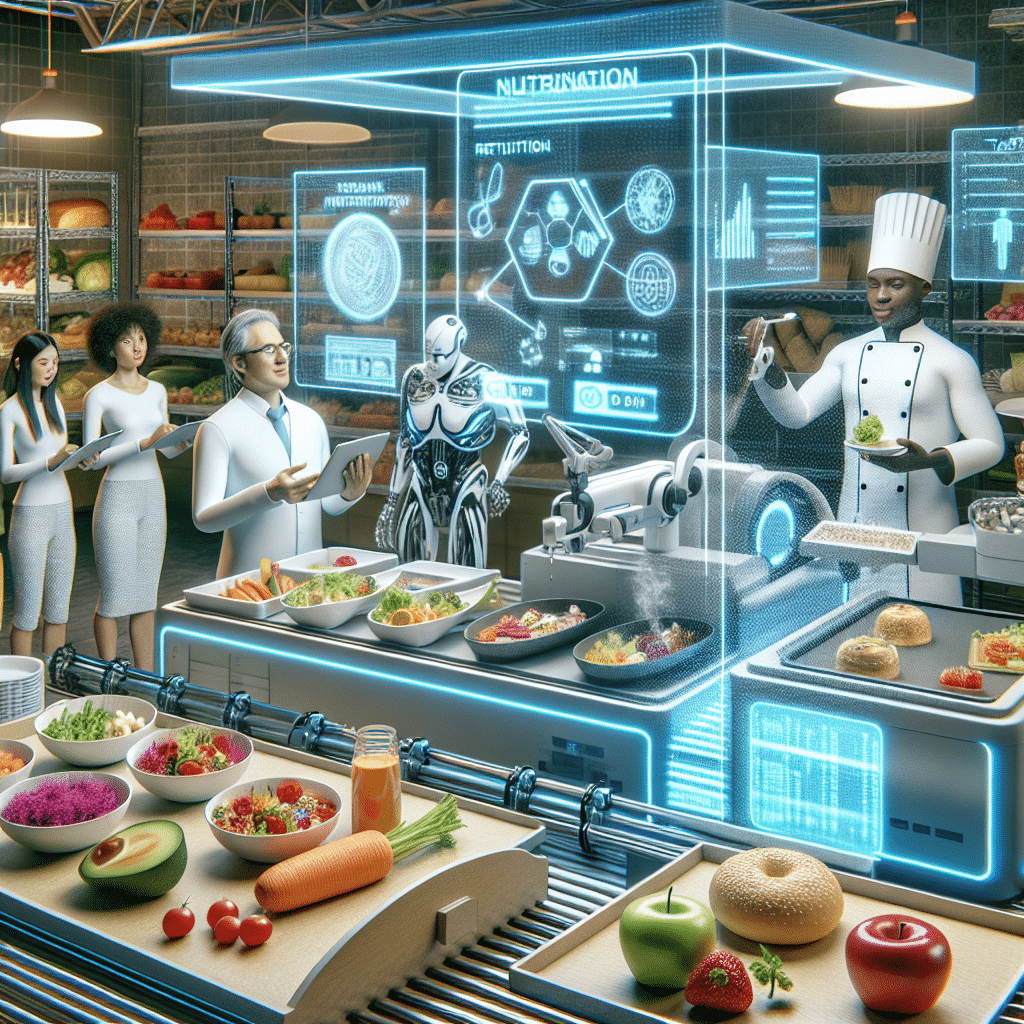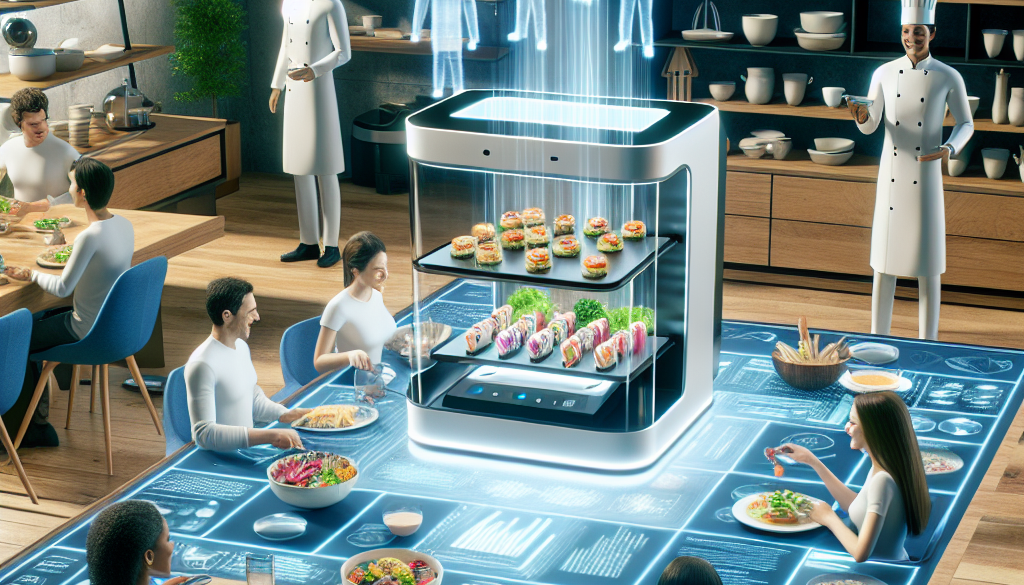Food Technology Innovations: The Future of Eating
-
Table of Contents
- Food Technology Innovations: Shaping the Future of Eating
- Lab-Grown Meats and Plant-Based Alternatives
- Personalized Nutrition and AI
- Smart Kitchen Appliances and Robotics
- Vertical Farming and Hydroponics
- Blockchain for Food Traceability
- 3D Food Printing
- Conclusion: Embracing the Future of Food Technology
- Discover ETprotein’s High-Quality Protein Products
Food Technology Innovations: Shaping the Future of Eating

The way we produce, process, and consume food has undergone significant changes over the past few decades, thanks to rapid advancements in food technology. Innovations in this field are not only transforming the culinary landscape but also addressing critical issues such as food security, nutrition, and sustainability. In this article, we will explore the cutting-edge technologies that are redefining the future of eating and how they are poised to revolutionize our relationship with food.
Lab-Grown Meats and Plant-Based Alternatives
One of the most groundbreaking developments in food technology is the creation of lab-grown meats and plant-based alternatives. These innovations are designed to mimic the taste and texture of traditional animal products while reducing the environmental impact of livestock farming.
- Cultured Meat: Also known as clean meat, cultured meat is produced by cultivating animal cells in a lab. This process significantly reduces the need for land, water, and energy, and it has the potential to lower greenhouse gas emissions.
- Plant-Based Proteins: Companies like Beyond Meat and Impossible Foods have developed plant-based products that closely resemble meat. These alternatives are not only appealing to vegetarians and vegans but also to meat-eaters looking to reduce their meat consumption.
Statistics show that the plant-based meat market is expected to reach $35.4 billion by 2027, indicating a growing consumer demand for sustainable and ethical food choices.
Personalized Nutrition and AI
Artificial intelligence (AI) is playing a pivotal role in personalizing nutrition. By analyzing data on individual dietary habits, genetic makeup, and lifestyle choices, AI can provide tailored dietary recommendations.
- Genetic Testing: Companies like 23andMe and Nutrigenomix offer genetic testing services that can identify specific nutritional needs based on an individual’s DNA.
- AI-Powered Apps: Apps such as Lifesum and Foodvisor use AI to track and analyze dietary intake, offering personalized meal plans and nutritional advice.
With the global personalized nutrition market projected to grow to $16.4 billion by 2025, it’s clear that consumers are seeking more customized approaches to their diets.
Smart Kitchen Appliances and Robotics
The integration of smart technology into kitchen appliances is enhancing the cooking experience by making it more efficient and user-friendly.
- Smart Ovens: Devices like the June Oven use sensors and AI to automatically recognize food and cook it perfectly every time.
- Robotic Chefs: Robotic kitchen assistants, such as Moley Robotics’ robotic kitchen, can prepare meals from scratch, learning recipes and techniques from chefs.
These innovations not only save time but also help reduce food waste by cooking with precision.
Vertical Farming and Hydroponics
Vertical farming and hydroponics are reshaping the way we grow food, particularly in urban environments where space is limited.
- Vertical Farming: This method involves growing crops in vertically stacked layers, often using LED lighting and climate control to optimize growth conditions.
- Hydroponics: Hydroponic systems grow plants without soil, using nutrient-rich water solutions. This technique can significantly conserve water and increase crop yields.
Companies like AeroFarms and Plenty are leading the way in these sectors, with the vertical farming market expected to reach $12.77 billion by 2026.
Blockchain for Food Traceability
Blockchain technology is enhancing food traceability, allowing consumers to track the journey of their food from farm to table.
- Supply Chain Transparency: Blockchain can record every transaction along the supply chain, providing a transparent and tamper-proof record.
- Food Safety: In the event of a foodborne illness outbreak, blockchain can quickly identify the source, enabling faster recalls and preventing further spread.
Walmart and IBM’s Food Trust initiative is an example of how blockchain is being used to increase transparency in the food industry.
3D Food Printing
3D food printing is an emerging technology that allows for the creation of complex food structures and customized nutrition.
- Customization: 3D printers can produce food in specific shapes, textures, and with tailored nutrient content.
- Sustainability: This technology has the potential to use alternative ingredients, such as proteins from insects or algae, to create more sustainable food products.
While still in its infancy, 3D food printing could become a common feature in both professional kitchens and homes in the future.
Conclusion: Embracing the Future of Food Technology
The innovations in food technology are not only exciting for food enthusiasts but also hold the promise of a more efficient, sustainable, and personalized food system. From lab-grown meats to AI-driven nutrition, the future of eating is being shaped by these technological advancements. As consumers become more conscious of their dietary choices and the impact on the planet, embracing these innovations will be key to meeting the demands of a growing global population.
Discover ETprotein’s High-Quality Protein Products
In line with the advancements in food technology, ETprotein is at the forefront of providing high-quality protein products that cater to the evolving needs of consumers. Their range of organic bulk vegan proteins and L-(+)-Ergothioneine (EGT) is designed to meet the highest standards of purity and sustainability.
Whether you’re a manufacturer, distributor, or trader in the food and beverage industry, ETprotein’s products offer a versatile solution for incorporating plant-based proteins into your offerings. With a commitment to non-GMO, allergen-free ingredients, ETprotein is an ideal partner for businesses looking to innovate in the food technology space.
About ETprotein:
ETprotein, a reputable protein and L-(+)-Ergothioneine (EGT) Chinese factory manufacturer and supplier, is renowned for producing, stocking, exporting, and delivering the highest quality organic bulk vegan proteins and L-(+)-Ergothioneine. They include Organic rice protein, clear rice protein, pea protein, clear pea protein, watermelon seed protein, pumpkin seed protein, sunflower seed protein, mung bean protein, peanut protein, and L-(+)-Ergothioneine EGT Pharmaceutical grade, L-(+)-Ergothioneine EGT food grade, L-(+)-Ergothioneine EGT cosmetic grade, L-(+)-Ergothioneine EGT reference grade and L-(+)-Ergothioneine EGT standard. Their offerings, characterized by a neutral taste, non-GMO, allergen-free attributes, with L-(+)-Ergothioneine purity over 98%, 99%, cater to a diverse range of industries. They serve nutraceutical, pharmaceutical, cosmeceutical, veterinary, as well as food and beverage finished product distributors, traders, and manufacturers across Europe, USA, Canada, Australia, Thailand, Japan, Korea, Brazil, and Chile, among others.
ETprotein specialization includes exporting and delivering tailor-made protein powder and finished nutritional supplements. Their extensive product range covers sectors like Food and Beverage, Sports Nutrition, Weight Management, Dietary Supplements, Health and Wellness Products, and Infant Formula, ensuring comprehensive solutions to meet all your protein needs.
As a trusted company by leading global food and beverage brands and Fortune 500 companies, ETprotein reinforces China’s reputation in the global arena. For more information or to sample their products, please contact them and email sales(at)ETprotein.com today.












